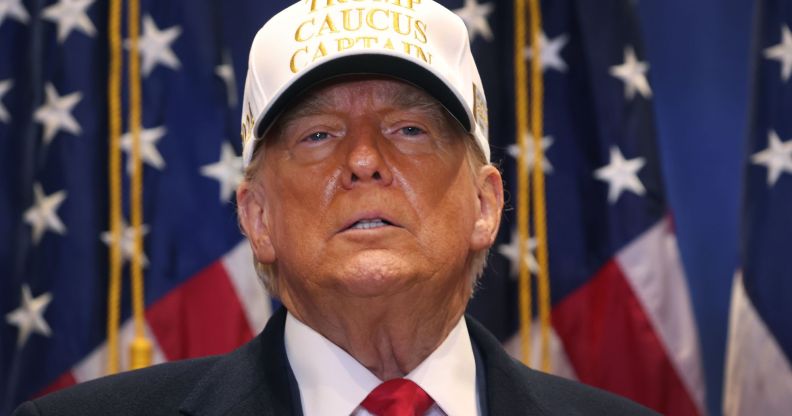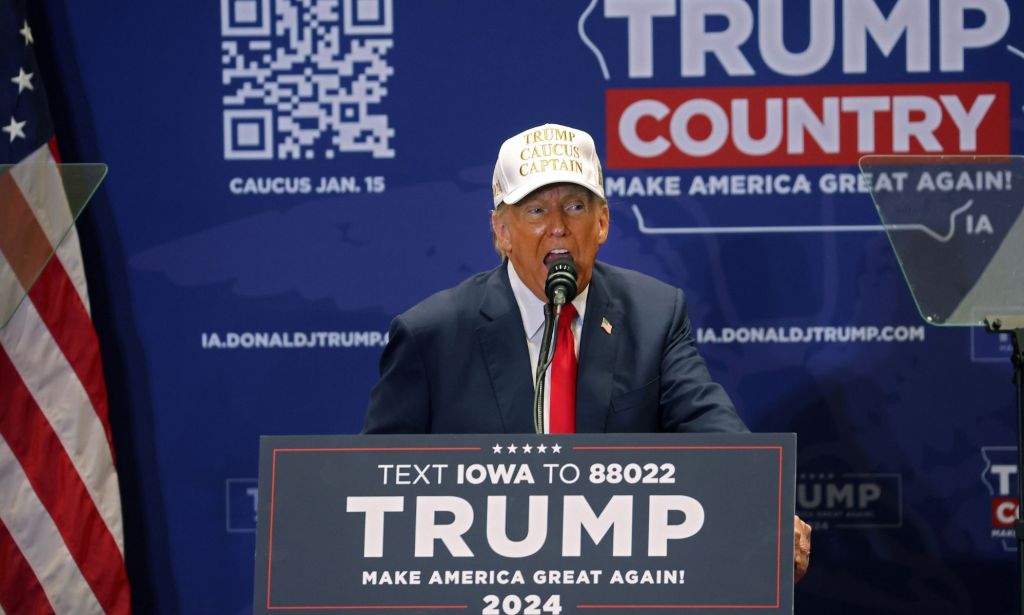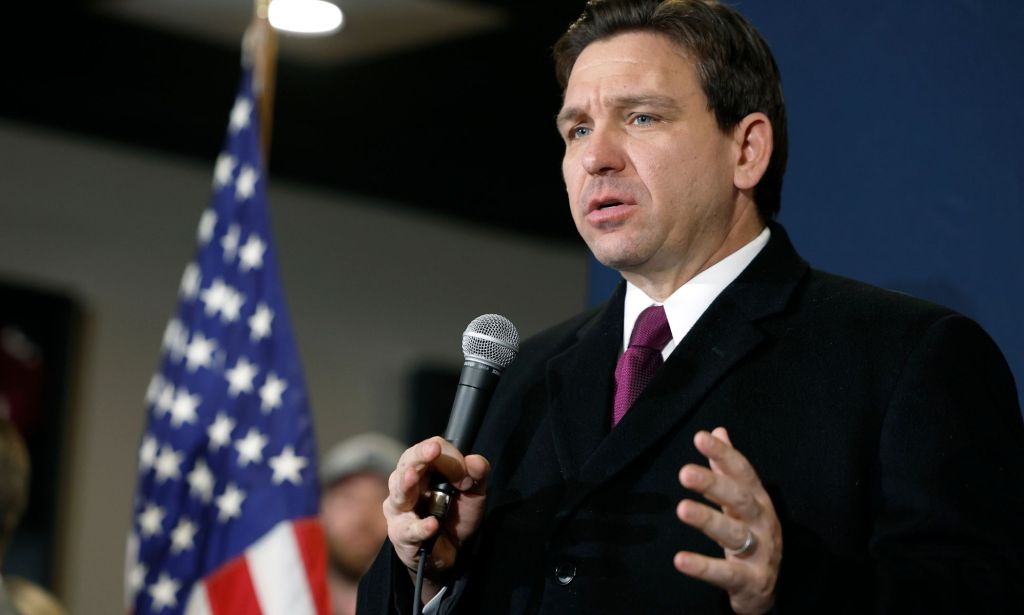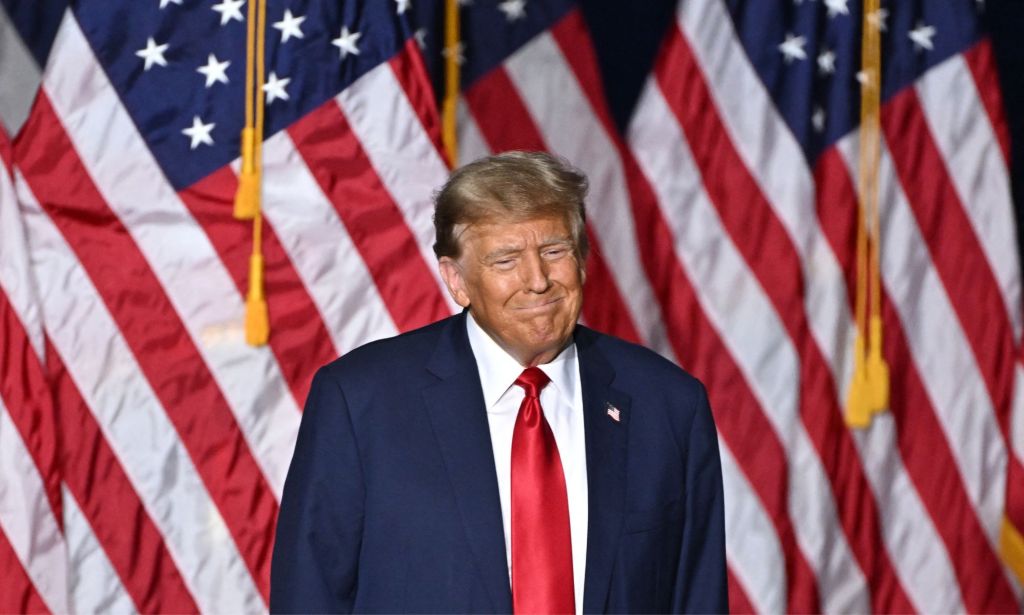What you need to know about Donald Trump’s win in Iowa

Donald Trump is the frontrunner to win the 2024 Republican presidential nomination. (Getty)
Donald Trump won the Republican Party’s Iowa caucuses by a landslide, confirming that the nomination is his to lose.
With more than 99 per cent of the results in, the former president had more than 51 per cent of the vote on Monday (15 January), according to the Associated Press’ election watch.
Ron DeSantis edged out Nikki Haley, a former ambassador and the governor of South Carolina between 2011 and 2017, in the battle for second place. The controversial governor of Florida picked up 21 per cent of the vote to Haley’s 19 per cent.
After finishing fourth, with no more than eight per cent, tech businessman Vivek Ramaswamy, as expected, pulled out of the race, admitting there was “no path for [him] to be the next president”. He now looks set to endorse Trump’s campaign, with some believing he has his eyes set on 2028.
Speaking as the results became clear, Trump hailed his “very special” victory and said he wanted to “straighten up the problems of the world” if he won back the White House from president Joe Biden.
Here’s what you need to know from the Iowa caucuses.
Why are the Iowa caucus results important?

There is an old saying in politics that there are “three tickets out of Iowa”, meaning there are only three presidential nominees who can feasibly advance from the Hawkeye State’s caucasus.
Historically, Republican presidential candidates have looked to the Iowa caucus – which marks the beginning of the process in which voters begin picking their party’s presidential nominee – to launch their campaigns to new heights.
However, winning big in Iowa doesn’t always result in over-all victory. Republicans there selected Mike Huckabee in 2008, Rick Santorum in 2012 and Ted Cruz in 2016 – none of whom went on to clinch the party’s nomination.
Still, Trump’s win, which gave him 20 delegates, has set the tone for the next six months.
What happens next in the 2024 Republican presidential race?

The next stop on the road to the Republican National Convention, which this year will be held in Milwaukee, Wisconsin, in July, is New Hampshire. The primaries there, which kick off on 23 January, will see 22 more delegates up for grabs.
States can hold either primaries, which is an election run by the state, or caucuses, a political meeting held by the state party, as part of their presidential nomination process. Both allocate delegates based on the percentage of the vote received by candidates.
At the national party convention, the candidate with the most delegates becomes the nominee.
Could Ron DeSantis or Nikki Haley still beat Donald Trump?

There is still time for DeSantis or Haley to secure votes in the lead up to the convention.
Haley, who was appointed as the US ambassador to the UN by Trump, trails her former boss in New Hampshire, as well as nationally, but her positioning has increased over the campaign trail thus far.
Trump is currently polling at 43 per cent among likely primary voters in New Hampshire while Haley is at 30 per cent, according to data from FiveThirtyEight. DeSantis is far behind, polling at only six per cent.
Haley’s campaign is already gearing up to take on Trump in the Granite State. After the Iowa results, her campaign manager, Betsy Ankney, believed the “field of candidates is effectively down to two” with only her candidate and the former president having “substantial support” in both New Hampshire and South Carolina, which holds its primary next month.

DeSantis is already on the move to drum up support at an event in Greenville, South Carolina, which sits in the state’s largely conservative north-western corner.
He’s doing a little better in South Carolina, holding 12 per cent of likely Republican primary voters, according to FiveThirtyEight’s polling average. Trump has 55 per cent, and Haley is at 35 per cent.
The paths for Haley and DeSantis to secure the nomination remain unclear, but it would be unwise to completely rule out an upset for the Trump campaign later down the line.
Does anything stand in Trump’s way to become president in 2024?

The results in Iowa showed how devoted Republicans remain to Trump as he continues on his third consecutive bid for the White House. But he remains his own worst enemy.
In the coming months, he faces 91 felony indictments across numerous criminal cases. The former president has denied all wrongdoing.
Super Tuesday – the largest single day of primaries and a crucial 24 hours in revealing who the major party nominee will be – is 5 March, when 16 states and one territory will vote. It’s also the day after the scheduled opening date of Trump’s first criminal trial, although that could change because of ongoing appeals.
Trump’s legal liabilities and continued use of anti-LGBTQ+ rhetoric haven’t dissuaded his faithful Make American Great Again (MAGA) fan base.
A poll of likely Republican caucus voters in Iowa found that 65 per cent said a potential criminal conviction before the general election wouldn’t alter their support for Trump, according to the Associated Press. Only 31 per cent felt he’d be unfit as president if convicted.
Some 46 per cent of the 1,628 Iowa Republicans polled considered themselves part of the MAGA movement.
How did this story make you feel?
